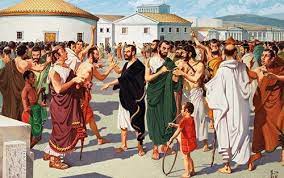Ph.D. in Ancient History: Introduction, Admission, Registration, Eligibility, Duration, Fees, Syllabus 2024

Introduction:
A Ph.D. in Ancient History delves into the rich tapestry of human civilization, from the rise of early societies to the fall of empires. It offers an opportunity to explore ancient cultures, religions, politics, economics, and more, through the analysis of archaeological evidence, primary sources, and historical texts. Graduates of this program are equipped with the skills and knowledge to contribute to scholarly research, education, cultural preservation, and public outreach.
Admission Process:
- Submit an online application through the university's admissions portal.
- Provide transcripts of undergraduate and any relevant graduate coursework.
- Letters of recommendation from professors or professionals familiar with the applicant's academic and research abilities.
- Statement of purpose outlining the applicant's research interests, academic background, and motivation for pursuing a Ph.D. in Ancient History.
- Writing samples or research papers demonstrating the applicant's analytical and research skills.
- Interview with faculty members or admission committee.
Eligibility:
- A master's degree in history, archaeology, classics, or a related field.
- Strong academic background with a minimum GPA requirement.
- Proficiency in relevant languages, such as Latin, Greek, Egyptian, or others, depending on the area of specialization.
- Research experience or relevant work experience may be preferred by some programs.
Completion Time:
The typical duration to complete a Ph.D. in Ancient History ranges from 4 to 7 years, depending on factors such as research progress, dissertation preparation, and program requirements.
Career Opportunities:
- University professor or lecturer in ancient history, archaeology, or related fields.
- Research scholar or curator in museums, libraries, or cultural heritage institutions.
- Archaeologist conducting fieldwork and excavation projects.
- Historical consultant for media, film, or television productions.
- Cultural resource manager for government agencies or non-profit organizations.
Syllabus:
- Historiography and Methodology in Ancient History
- Ancient Civilizations: Mesopotamia, Egypt, Greece, Rome, and Beyond
- Archaeological Methods and Techniques
- Ancient Languages: Latin, Greek, Hieroglyphs, Cuneiform, etc.
- Topics in Social, Political, Economic, and Cultural History
- Seminar Series in Ancient History Research
- Dissertation Research and Writing
Internship Opportunities:
- Fieldwork and excavation projects with archaeological teams.
- Internships with museums, libraries, or cultural heritage organizations.
- Teaching assistantships within the history department.
- Opportunities for archival research or cataloging historical artifacts.
- Collaborative projects with international research institutions.
Scholarships and Grants:
- Graduate assistantships providing stipends and tuition waivers.
- Institutional scholarships or fellowships based on academic merit.
- Research grants from government agencies such as the National Endowment for the Humanities (NEH) or private foundations.
- Travel grants to attend conferences or conduct research abroad.
- Funding opportunities from cultural heritage organizations or archaeological societies.
FAQs:
What areas of specialization are available in a Ph.D. program in Ancient History?
Specializations may include ancient civilizations, classical studies, archaeology, religious history, military history, gender studies, or art history, among others.
Do I need to have prior knowledge of ancient languages to pursue a Ph.D. in Ancient History?
While prior knowledge of ancient languages is not always required, proficiency in relevant languages can enhance research opportunities and access to primary sources.
What research opportunities are available in a Ph.D. program?
Research opportunities may include conducting original research projects, participating in archaeological excavations, publishing scholarly articles, presenting research at conferences, and contributing to collaborative research initiatives.
Are there opportunities for public engagement and outreach in Ancient History?
Yes, many Ph.D. programs in Ancient History emphasize public engagement and outreach through museum exhibitions, educational programs, public lectures, and digital humanities projects.




